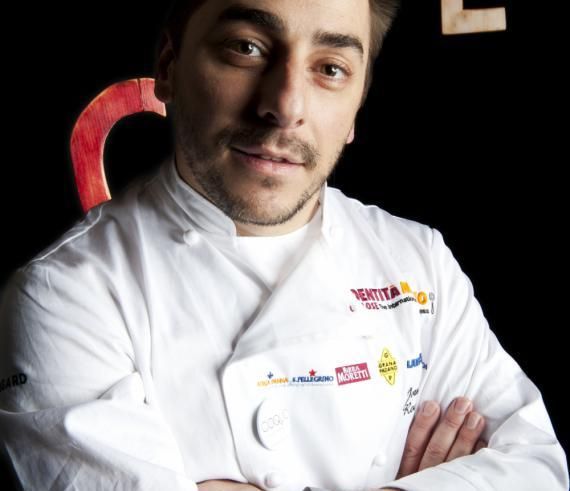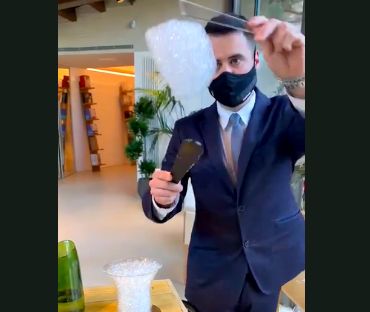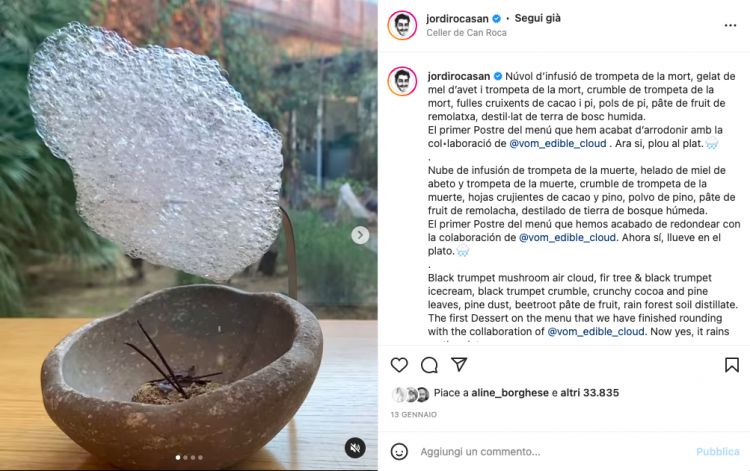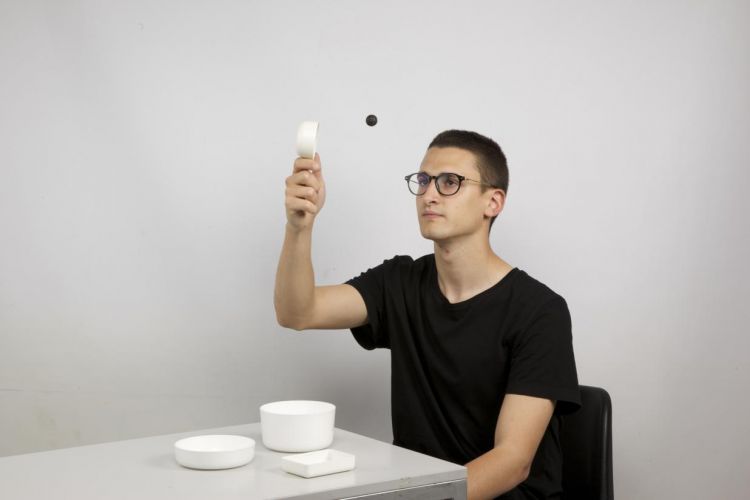A cake that is (also) a cloud. It condensates and becomes an aromatic rain on the plate, enriching the other components. And it can even fly away, if you don't hold onto it.
It looks like magic, almost bizarre. It's the new brilliant idea of the great Jordi Roca, the youngest of the tres hermanos who have changed world cuisine. In Gerona, at El Celler de Can Roca, guests have been able to taste Bosque lluvioso ("Rainy wood") since 2017, a magnificent dessert that pastry chef Jordi invented during his morning walks. He said: «I usually go for a walk in the woods with my dog, in the morning. I can sense the damp of the wood, the mushrooms, the brook, the scent of the air when there's a little rain... That's where the idea came from».
Over the years, the dish has had many versions. The latest was announced a few days ago, and it surprised everyone. It's based on a jelly of sugared beetroot (a sort of fruity pâté), with a textured water of distilled soil («The soil from the forest near where I live»), following a now classic technique at Celler. Then there's also a gelato of pine honey and horn of plenty and carob, powdered pine and finally wafers in the shape of leaves, made with carob and cocoa.

Jordi Roca a few years ago at Identità Milano
Up to here: a complex, very interesting dessert, but nothing particularly innovative. The plate on which these elements we've described, however, has a unique feature: it's a sort of metallic perch. Normally, in fine dining, a similar solution serves to keep some aromatic foam afloat. In this case it's the contrary. The foam is "anchored" to the perch, because it would otherwise fly away.
Let's explain: this is the "impossible" part of the dessert. A cloud made of an infusion of horn of plenty and «structured with jellifying agents to create a very ethereal foam». The maître of Celler arrives with a cart from which a sort of glass vase comes out, which holds this foam (underneath, hidden in the cart, there's a machine making the foam); he "cuts" a portion, making sure it doesn't escape him, otherwise this will fly away like a balloon, and it will end up stuck to the ceiling of the restaurant.

The maître at Celler dealing with the cloud flying away
Instead, if the maître is careful, he "stabs" the cloud to the metal perch on the plate. A few seconds later, a few drops start to burst, through a normal process of condensation: then the drops of liquid (the mushroom infusion) are freed like rain, wetting the sweet landscape below.
But how can the cloud fly? This is the result of an important partnership that Jordi Roca launched with the Plat Institute (Institute of Augmented Gastronomy, Food Design, Food Tech & Sustainability), which created a technique to incapsulate aromas and flavours called Vom. This basically allows to inflate the foam with helium, so that it becomes super-light and huge at the same time.

Jordi Roca's post on Instagram
"And now, indeed, it's raining on the plate", Jordi announced on his Instagram account. And he added: «It's a sort of visual poem, if you want. A gastronomic concession that I've allowed myself to, to underline the concept of this dish». An edible landscape of rainy forest that includes rain and clouds. Incredible.
Jordi Roca had presented a similar technique – let's call it the previous step – in the latest edition of Madrid Fusión: that dessert too, which was called El alma del cacao, had a cloud, but made with distilled cocoa: its lightness allowed it to move in the air. However, it didn't win over gravity, but it fell on the plate (WATCH THE VIDEO). This Bosque lluvioso is a further evolution, made possible by Vom. Colleague David Salvador of culinary magazine 7 Canibales (read here) further researched the technique of the Plat Institute in Barcelona, a think tank of engineers and chefs, some of whom trained at the Basque Culinary Center. He explains how the Plat Institute is committed to find "an efficient use for restaurant waste, generating new business and recycling models. In this sense, they run research projects with large food corporations – like Nestlé or Diageo – that follow a no waste policy"; they made functional prototypes of bottled juices made with the peel of the fruits, or edible spoons, or products and materials made with orange peel, mussel shells or leftover dehydrated soup, to use in a 3D printer. «It's like looking at waste with the eyes of alchemy», Ignacio de Juan-Creix founder of the research centre explained. And he also works with restaurants, as in the case of El Celler de Can Roca. «We work with colloidal structures based on water because it’s the best way to incapsulate light gasses. The structures can float or fly away, depending on the density».

A surprising application of these experiments is also given by "flying chocolate": a chocolate candy that englobes some gas (helium and argon) and which therefore remains afloat in front of the guest. It can be completed with other gadgets patented by the
Plat Institute, like the "flying plate" (thanks to the addition of the magnetic technology, the plates can be lifted up to 50 cm above the table without a physical support, and can hold up to 400 grams of weight).
Translated into English by Slawka G. Scarso